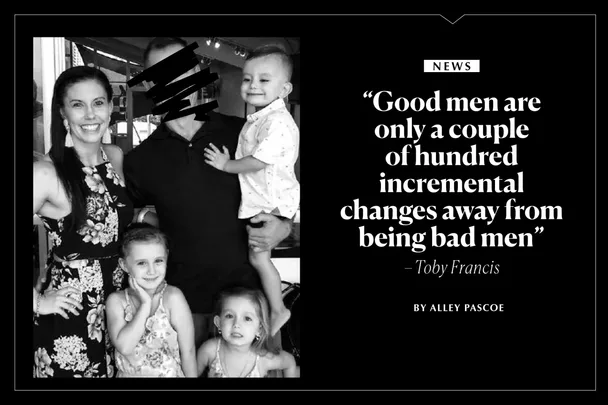Violence against women isn’t a women’s issue; it’s a human rights issue. And the only way we’re going to change the appalling statistic that “one Australian woman a week is killed by her current or former partner” is if men start taking accountability for their actions and seeking help.
Following the horrific murder of Hannah Clarke and her three children Aaliyah, Laianah and Trey in Brisbane last week, the number of men seeking help to stop committing domestic violence in Queensland has surged.
According to Prevention of Domestic and Family Violence Minister Di Farmer, the brutal attack has sparked a significant increase in calls for help.
“In the past few days, [people who work in the DFV sector] have seen an incredible surge in calls from people asking for help – and importantly, from people asking for help to stop being violent,” Farmer told AAP.
It’s important to remember domestic violence isn’t just physical – it can include emotional, financial and sexual abuse, as well as coercive control.
In the case of Clarke, she experienced all of the latter at the hands of her estranged husband and murderer Rowan Baxter. Clarke’s friend Manja Whaley has revealed that Clarke didn’t think she was in a violent relationship, because Baxter “never hit her.”
But Baxter did threaten Clarke. He did dictate what clothes she wore. He did ban her from wearing bikinis and shorts – even though she worked in the fitness industry. He did isolate her. He did frighten his children. And he did kidnap their daughter for four days after they separated. This is what domestic violence looks like. Just because he doesn’t hit you, doesn’t mean it’s not abuse.
The murder of Clarke and her children was a premeditated, deliberate decision, says Whaley, “This is the act of a man who believed he owned his children and wife, that they were objects to be controlled…. This is not love, this is coercive control; the act of threats, intimidation, assault and humiliation or other abuse that is used to harm, punish or frighten their victim… In this case to frighten his own children and wife… He is NOT the victim.”
Even though they might not leave physical scars or bruises, the effects of coercive control are dangerous and frightening.
The deplorable behaviours can include, but are not limited to:
- threatening to expose private photographs of their partner or ex-partner
- preventing their partner from ending the relationship by threatening to, or actually engaging in, self-harm
- confiscating or destroying their partner’s mobile phone
- deleting all male contacts on their partner’s social media
- threatening to or actually harming their partner’s pets
- demanding that their partner eat certain foods
- demanding that their partner sleep on the floor
- prohibiting their partner from seeking or continuing employment
- controlling their partner’s finances
- conducting regular inspections of their partner’s home or body for evidence of infidelity
In most cases (but not all), these actions involve actual or threatened physical violence. And while men can be victims of coercive control, the overwhelming majority of victims are women.
And it’s time for the main perpetrators of coercive control – men – to sort their shit out.
In a powerful and incredibly self-aware Facebook post, Sydney man Toby Francis has done just that. He owned up to his past mistakes and revealed how he sought help before his behaviour escalated, explaining “We must end the myth of the good man. It isn’t only bad men who are susceptible to perpetrating domestic violence. Good men are only a couple of hundred incremental changes away from being bad men.” Read his important message here…
When I first moved out, and Lauren and I had just started living together, I would get angry and break things. Smash a plate, or break a broom out the back.
My mate Troy and I were driving to Broadway Shopping Centre one day and I told him about an argument that Lauren and I had that ended up with me smashing something. He told me, in no uncertain terms, that what I was doing was violence that would one day turn into me pushing Lauren, which would one day turn into me punching Lauren, which would one day turn into me hitting our kids. And it might stop there but maybe it wouldn’t. Maybe one day it would turn into the kind of thing we have seen happen just recently where a man set a car alight with his children and their mother inside. (All because she tried to leave.)
I remember being shocked and resistant to the idea. I would never — and have never — hit or physically hurt my partner. I was not the kind of man that would commit domestic violence, let alone MURDER someone. Let alone a woman, let alone my partner. I was just the kind of person who needed to break a rake now and then when Lauren and I couldn’t resolve a fight. That was all it was. Just a plate or two. Or a hole in the wall.
But what Troy said wouldn’t leave my mind. He was so very angry with me at the time. He didn’t swear at me, he didn’t abuse me, but he was mad about it. It didn’t ruin the day, we finished our shopping and hung out after but he was angry about me smashing the plate. Or the rake. Or the broom. Whatever it was, I can’t remember. I broke a lot of stuff.
So I read up on it that night. I read stories from domestic violence survivors, I read articles and advice written by experts who deal with this sort of thing. And Troy was right. Abusive words escalate, smashing stuff escalates, pushing escalates, punching escalates. Murder doesn’t. Murder is the final escalation.
I was gobsmacked. Sad. Confused. I was a good man. I loved my partner. I would love our kids. I would never — had never — laid a hand on her. But every thing I read began similarly, “he always used to get angry, and then he started punching holes in the wall/smashing plates/slamming doors.” These stories ended with violence. Always. Because, I realised, they started with violence.
The smashing of plates, the slamming of doors, the punching of walls. It’s all violence. It’s all the start of a burning wick that leads to a horrific end. These objects are placeholders for the people we aren’t allowed to hit. And one day, those placeholders don’t do the job anymore and a push makes its way into the argument. Just a push. It’s not a big deal, you rationalise, and you’re sorry. And it won’t happen again, you say. And you don’t want it to happen again, you know. Because, of course you don’t. You are a good man. A good man who doesn’t hit his partner, doesn’t beat his kids, wouldn’t cover the car in petrol and set them alight.
But domestic violence doesn’t work like that. It isn’t born only in bad or evil men. Domestic violence is born from small changes in already violent acts. It doesn’t care how good you want to be, and it doesn’t care how good you‘ve been in the past. It doesn’t care how much you love or how much you don’t. It doesn’t care that you are, by all accounts, good. These behaviours don’t care about your intentions, they aren’t even there for you. They are there to be the food that feeds the monster of anger and aggression. And that beast will grow in size and want for more food. It will want for more aggressive behaviours in order to quiet. And you’ll give in because every escalation is only a small step from the last one and every time it happens it is easier for it to happen again. And every time it happens again you make an excuse that if she hadn’t done what she had done or said what she had said, you wouldn’t have done what you did. Because you’re a good man. You know you are. I mean, come on, let’s not make a big deal out of it, you just broke a plate. You just punched a wall. You only pushed her back, hit her once, burned her and your children alive in a car.
We must end the myth of the good man. It isn’t only bad men who are susceptible to perpetrating domestic violence. Good men are only a couple of hundred incremental changes away from being bad men. Which is why good men don’t think they can become bad men and bad men don’t think they’ve changed.
Obviously, I don’t know what would have happened if Troy hadn’t called me on my behaviour. Maybe none of it would have escalated. That’s not what the research says is likely but maybe I am different. Maybe I just would have smashed plates forever. But that’s the point, we don’t know where that ends. We only know that, unaddressed, that behaviour has only two possible outcomes: it either stays the same or it escalates. Those are the only two choices. There is no possible world in which someone starts breaking kitchenware and just one day stops all of a sudden. They either keep breaking kitchenware or they move onto people. Or, they get help.
I dealt with my anger by seeking professional help. I received a diagnosis of ADHD in my late 20s which I was able to treat and which helped me understand why I wasn’t processing arguments the way I was told I should be. I was able to develop tools that allowed me to do that with professional help. (Spoilers: I’m still insufferable when it comes to arguments, I just don’t get mad or smash stuff anymore.)
If any man is reading this and feels ashamed that they do the same thing then I hope you know I felt ashamed too. I still feel ashamed about it. I questioned writing this because I wondered if people I knew would be ashamed of me or if their opinion would change. Even though I never hit or hurt anyone. They were just plates. I feel ashamed because admitting that what I did was what all abusive husbands once did would mean admitting that maybe one day I could hit a woman, hurt our kids, end up as “not a good man”. If you are ashamed, so was I. But that shame is healthy.
Shame can come without judgement from those who want you to get better, to do better. You will find no judgement from a professional who can help give you the tools to be better. You will find no judgement from the psychiatrist who may be able to diagnose a neurological condition or mental health problem you didn’t know you had. And I hope you find no judgement from your friends and family when you tell them you think you need to deal with your anger in a professional setting and become a better man. An acknowledgement of shame can be healthy and we can grow from it. We can be better men not in spite of our shame but because of it. In fact, I’d argue, we can only be better men by being ashamed of our unacceptable behaviours.
And we must be better men. We must be better husbands and partners. We must be better fathers. And we must be better mates. Like Troy was to me. Nothing will change without us changing ourselves, without holding our friends and family members accountable, change can only truly come from us because it starts there. And it ends there. It starts and ends with us.
I never thanked Troy for what he did and said that day. I never thanked him for his caring, rational, non-judgmental, and non-violent anger. But he’ll read this so here it is: Thank you for what you said that day, thank you for holding me accountable, and thank you for helping me be better. Thank you for being what it actually means to be a mate.
It is time for all of us to leave the want to be a good man behind and embrace the need to be a better one. Because that’s the only kind of good that matters.
This is how real change is made – when men own their mistakes, seek help and do better. Blokes, take note.
We can’t win this battle on our own – join us.
If you or someone you know needs help contact the Australian Helpline 1800 RESPECT (1800 737 732).










